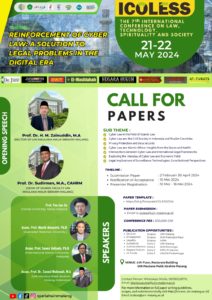Background
7TH ICOLESS (International Conference on Law, Technology, Spirituality and Society) On the Theme: “Reinforcement of Cyber Law: A Solution to Legal Problems in Digital Era”
In our rapidly advancing digital age, the proliferation of technology has ushered in unprecedented opportunities and challenges. As our reliance on digital platforms grows, so does the need for robust legal frameworks to navigate the intricate web of legal problems arising in the digital landscape. Recognizing this imperative, the organization of an international seminar themed “Reinforcement of Cyber Law: A Solution to Legal Problems in Digital Era” becomes not just relevant but indispensable.
The ubiquity of the internet and digital technologies has blurred the boundaries of traditional legal jurisdictions, posing unique challenges that demand innovative legal solutions. Cybercrimes, data breaches, and intellectual property issues have become pervasive, transcending national borders and necessitating a collaborative, global approach to address them effectively. An international seminar serves as a crucial platform to bring together legal scholars, practitioners, policymakers, and industry experts from across the globe to collectively tackle these pressing challenges.
Cyber law also affects various lines of life even in the smallest scope, namely the family. The relationship between cyber law and family resilience is symbiotic. Cyber laws play a crucial role in protecting families from online threats, ensuring privacy, and regulating digital interactions. Conversely, the resilience of families in navigating the digital landscape can influence the development and adaptation of cyber laws to better address the evolving needs of the family unit in the digital era. This interplay emphasizes the importance of a harmonious relationship between legal frameworks and family dynamics to create a secure and supportive environment in our digitalized society.
The urgency of such a seminar is underscored by the escalating frequency and sophistication of cyber threats. As technology evolves, so do the methods employed by malicious actors, making it imperative for legal professionals to stay abreast of the latest developments. The seminar provides a dynamic forum for participants to exchange insights, share best practices, and discuss emerging trends in cyber law, thereby fostering a proactive response to the ever-evolving digital landscape.
Furthermore, the seminar serves as a catalyst for international cooperation in the realm of cyber law. Legal systems around the world must synchronize and adapt to the rapid pace of technological change. By facilitating dialogues and collaborations between legal experts from diverse backgrounds, the seminar encourages the development of standardized, effective legal frameworks that can address global digital challenges comprehensively.
Importantly, the seminar acts as a conduit for knowledge dissemination. It provides a platform for presenting cutting-edge research, case studies, and practical solutions that can be adopted by legal practitioners and policymakers. This dissemination of knowledge is essential for building a collective understanding of the legal intricacies of the digital era and fostering a community of professionals dedicated to staying ahead of cyber threats.
In conclusion, the urgency of organizing an international seminar on the “Reinforcement of Cyber Law” is apparent in the face of the complex legal problems arising from the digital revolution. By bringing together global expertise, fostering collaboration, and disseminating knowledge, such a seminar is not only timely but instrumental in shaping a secure and legally resilient digital future. As we navigate the challenges of the digital era, the collaborative efforts spurred by this seminar will undoubtedly contribute to the advancement of cyber law and the protection of our digital society.
The 7th edition of the International Conference on Law and E-Security (ICOLESS) is set to take place on May 21-22, 2024, under the theme “Reinforcement of Cyber Law: A Solution to Legal Problems in the Digital Era.” This annual conference serves as a crucial platform for legal professionals, academics, and industry experts to converge and address the escalating challenges posed by the rapid evolution of digital technologies.
With an unwavering focus on the pressing need to fortify cyber laws, ICOLESS 2024 aims to explore innovative solutions to legal issues arising in the digital landscape. Participants can expect a comprehensive discussion on the latest legal developments, emerging cyber threats, and the evolving regulatory frameworks that shape the global digital environment.
The conference will feature keynote speakers renowned for their expertise in cyber law and e-security, fostering insightful dialogues and sharing cutting- edge research. Various sessions, workshops, and panel discussions will delve into topics such as data protection, intellectual property in the digital age, international cooperation in cybercrime prevention, and the challenges of regulating emerging technologies.
ICOLESS 2024 provides a unique opportunity for professionals and scholars to exchange ideas, collaborate on research, and contribute to the ongoing discourse surrounding the legal aspects of the digital era. As the seventh installment of this esteemed conference, ICOLESS continues to be at the forefront of promoting advancements in cyber law to ensure a secure and legally sound digital future.
ICOLESS 2024 would be hosted by Sharia Faculty, Universitas Islam Negeri Maulana Malik Ibrahim Malang, Indonesia. It will take place on May 21-22, 2024 . Prospective scholars, researchers, social scientists, and practitioners are cordially invited to submit full papers, which have not been submitted/published/under consideration in other conferences and journals. The full paper can be submitted to http://conferences.uin-malang.ac.id/index.php/ICOLESS The deadline for submission is 2 Februari 2024 extended to 30 April 2024, 00.00 (GMT +7) and acceptances will be notified by 10 May 2024. The paper must be written based on author guideline link http://conferences.uin-malang.ac.id/index.php/ICOLESS/guide.
ICOLESS 2024 would publish significant original research from a broad range of the challenges and opportunity of law and Islamic Law. All full paper submissions will be peer-reviewed and evaluated based on originality, technical and research content, correctness, relevance to the conference theme, contributions, and readability. All accepted conference papers will be submitted to international e-Proceeding with ISSN, and selected paper will be nominated to De Jure: Jurnal Hukum dan Syariah (Scopus), Jurisdictie: Jurnal Hukum dan Syariah (Sinta 2), El Maslahah (Scopus), Legality (Scopus), Jurisdictie (Sinta 2), Justicia Islamica (Sinta 2), Negara Hukum (Sinta 2), At Turots (Sinta 3), and International Proceeding (ISSN online)
Theme:
“Reinforcement of Cyber Law: A Solution to Legal Problems in Digital Era”
Sub themes
- Cyber Law in the Field of Islamic Law
- Cyber Law and the Civil Society in Indonesia and Muslim Countries
- Privacy Protection and Data Security
- Cyber Law and Islamic Ethics: Insights from the Quran and Hadith
- Intersections between Cyber Law and International Legal Frameworks
- Exploring the Interplay of Cyber Law and Economic Field
- Legal Implications of Surveillance Technologies: Constitutional Perspectives
Email : icoless@uin-malang.ac.id



